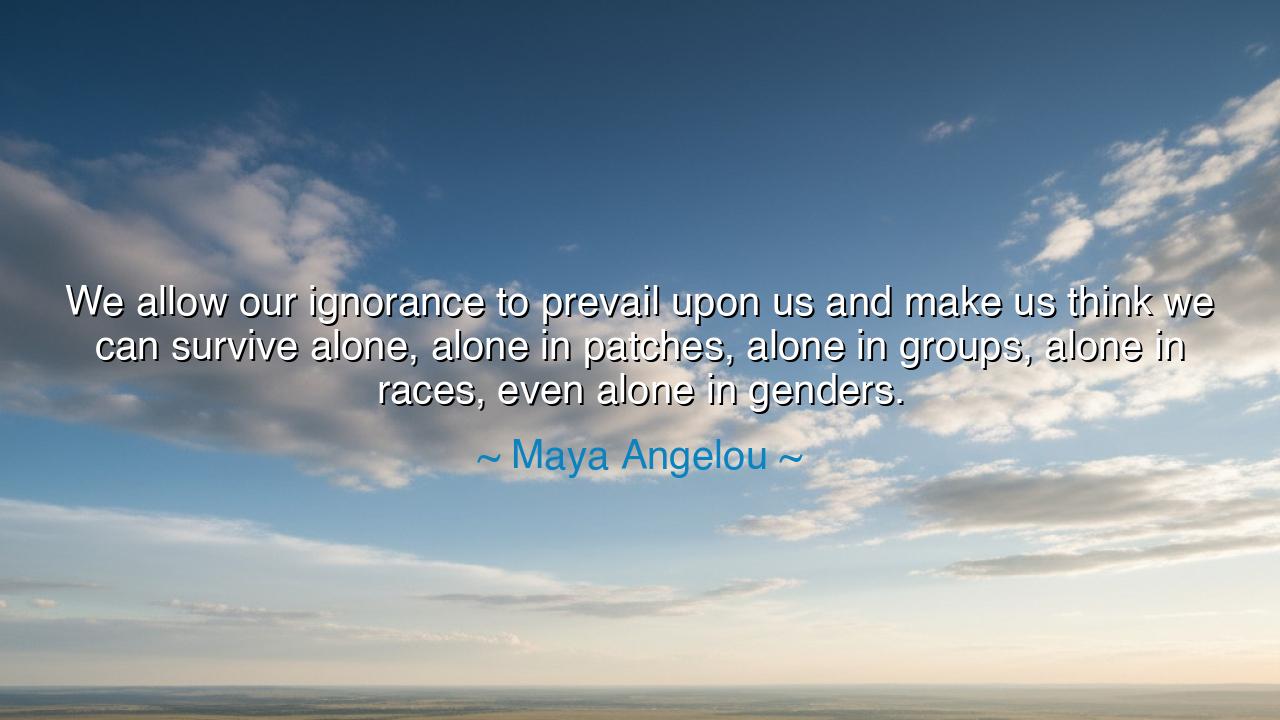
We allow our ignorance to prevail upon us and make us think we
We allow our ignorance to prevail upon us and make us think we can survive alone, alone in patches, alone in groups, alone in races, even alone in genders.






Maya Angelou speaks with profound insight when she says, "We allow our ignorance to prevail upon us and make us think we can survive alone, alone in patches, alone in groups, alone in races, even alone in genders." This powerful statement unveils the dangerous lie that ignorance often leads us to believe—that we can exist in isolation, disconnected from one another, separated by race, gender, or other artificial divides. In truth, humanity is a tapestry woven from the threads of many diverse lives, and to believe that we can stand apart is to sever ourselves from the very strength that binds us together.
From the earliest times, the wisdom of the ancients taught that community is the foundation of a prosperous life. The great philosophers of Greece, like Aristotle, understood that man is a social animal. He did not exist in isolation, but in connection with others. His flourishing was intertwined with the flourishing of the city, the polis, the community. Aristotle’s vision of the good life was one in which individuals worked in harmony, for only through mutual support and shared purpose could true happiness and fulfillment be found. To live apart from society was, in his view, to live half a life, cut off from the very essence of what it meant to be human.
Maya Angelou's warning speaks to this ancient truth. When we allow our ignorance—our unawareness of our interdependence—to prevail, we create a false illusion of self-sufficiency. We imagine that we can survive alone, in our separate patches—our isolated communities, our narrow identities—cut off from the rich, interconnected whole of humanity. Yet history has shown us time and again that such division leads to disaster, both for the individual and for the larger society. Divides—whether based on race, gender, or other forms of difference—do not strengthen us; they weaken us, for they blind us to the power of unity and shared purpose.
Consider the story of Nelson Mandela, whose life serves as a testament to the dangers of separation and the power of unity. For decades, South Africa was torn apart by the forces of apartheid, a system that sought to divide people based on their race. In the midst of this divisive climate, Mandela stood firm in his belief that the survival and progress of his people depended on coming together, on transcending the artificial boundaries of race. His willingness to engage in dialogue with his enemies, to seek a unified vision for the country, ultimately brought an end to apartheid. Through his efforts, Mandela showed the world that separation and ignorance—the belief that we can live apart from one another—are not only false but also destructive to the very fabric of society.
History also gives us the example of Susan B. Anthony, a tireless advocate for women’s rights in the United States. She understood that the struggle for equality was not about women surviving alone or in isolation, but about joining together with men, and with each other, to change the systems that had long oppressed them. By seeking solidarity and a common vision of justice, she and her fellow suffragists shattered the chains of ignorance that had confined women to the shadows. Through their collective efforts, they changed the course of history, proving that when we stand together, we can overcome the most deeply entrenched systems of inequality.
The lesson here is clear and urgent: ignorance thrives when we allow ourselves to believe that we can survive in isolation—whether alone, or within the narrow confines of our own identity. Angelou's wisdom calls upon us to recognize the essential truth of our interconnectedness. We cannot thrive alone. Survival—true survival—depends on our ability to transcend divisions and embrace the shared humanity that binds us all together. No one race, no one gender, no one group can flourish in isolation. We are all part of the same whole, and our strength lies in our ability to unite and build a world where everyone is valued and heard.
Therefore, dear reader, reflect upon your own life. In what ways have you allowed ignorance to shape your beliefs about separation and division? Have you closed yourself off from others, believing that you are self-sufficient or that your identity is your only concern? If so, let this be a call to action. Seek the strength that comes from unity. Look beyond the superficial divisions that separate us and embrace the common thread that runs through us all. Engage with those who are different from you—across race, gender, and all other distinctions—and discover the power of shared purpose. In doing so, you will find that together, we can survive and thrive, building a future that is greater than the sum of its parts.






AAdministratorAdministrator
Welcome, honored guests. Please leave a comment, we will respond soon